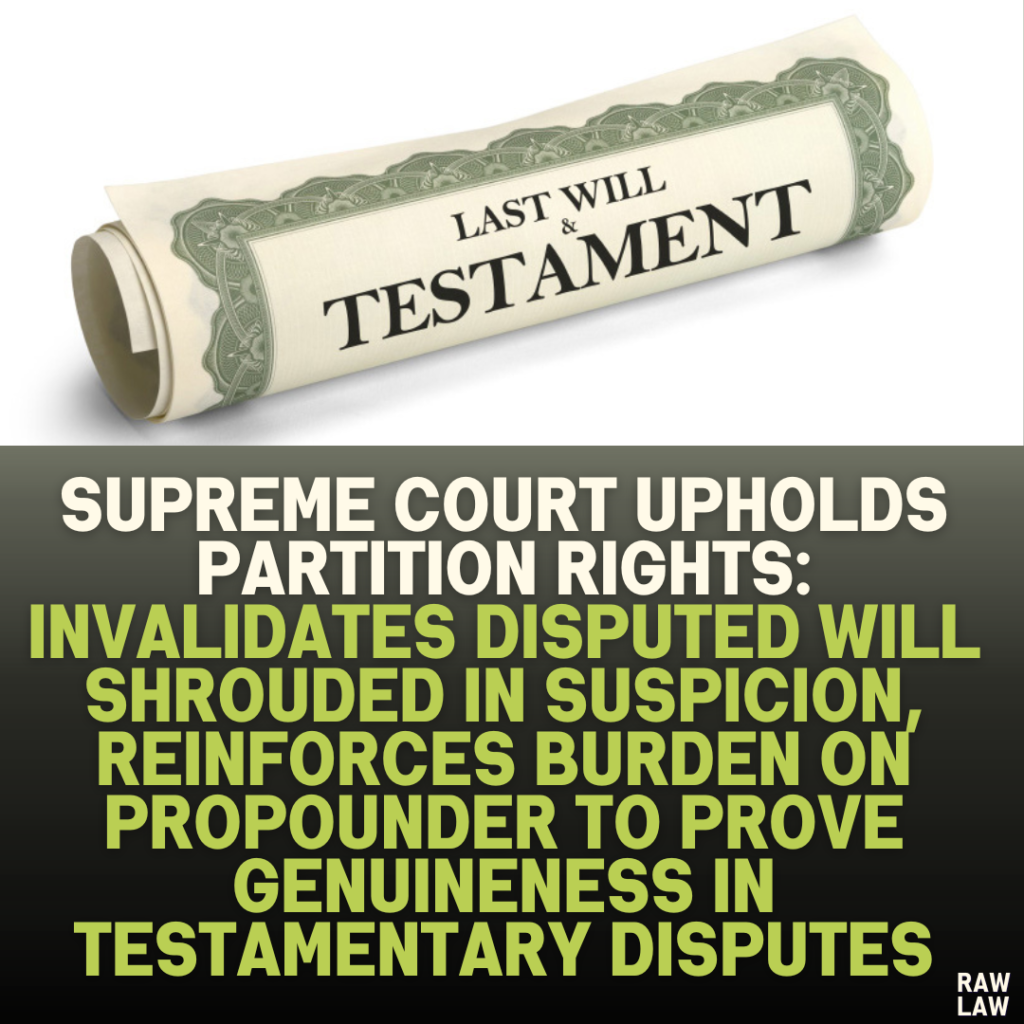Court’s Decision:
The Supreme Court dismissed the appeal filed by the defendants (second wife and her children), affirming the decisions of the Trial Court and the High Court. Both lower courts found that the Will dated 06.04.1990, purportedly executed by Balasubramaniya Thanthiriyar, was invalid as it was surrounded by suspicious circumstances. The Court upheld the division of property based on the 1989 partition deed, granting the plaintiffs (children of the first wife) a 5/7th share in the disputed properties.
Facts:
- Property Ownership: The suit properties originally belonged to Balasubramaniya Thanthiriyar, who married twice. Through his first wife, Rajammal, he had three sons and two daughters (the plaintiffs). His second wife, Leela, and her two sons (the defendants) were considered illegitimate as their marriage occurred while the first wife was still alive.
- Partition Deed: In 1989, Balasubramaniya divided his properties into four schedules through a partition deed:
- The first schedule was retained by him.
- The second schedule was allotted to his sons from the first wife.
- The third schedule went to his first wife.
- The fourth schedule was allotted to his minor daughter.
- Disputed Will: After Balasubramaniya’s death in 1991, the defendants produced an unregistered Will from 1990, claiming it bequeathed the properties from the first schedule to them. The plaintiffs challenged the Will, asserting it was forged and invalid.
- Legal Proceedings: The plaintiffs filed a suit for partition and allotment of their 5/7th share in the properties. The defendants contested the suit based on the Will.
Issues:
- Was the Will dated 06.04.1990 validly executed?
- Were the plaintiffs entitled to a 5/7th share in the properties?
- Should the appeal be allowed, overturning the concurrent findings of the lower courts?
Petitioner’s Arguments (Appellants/Defendants):
- Validity of Will: The defendants argued that the Will was validly executed under Section 63 of the Indian Succession Act and Section 68 of the Evidence Act. They contended the Will was attested by two witnesses, fulfilling statutory requirements.
- Intent of Testator: The testator intended to provide for his second wife and her children, as evidenced by the Will.
- Partition Deed’s Limited Scope: The partition deed did not extinguish the testator’s right to dispose of his share through a Will.
- No Sufficient Suspicion: The appellants argued that the circumstances highlighted by the lower courts were insufficient to invalidate the Will.
Respondent’s Arguments (Plaintiffs):
- Suspicious Circumstances: The plaintiffs pointed to various inconsistencies and irregularities:
- The involvement of the first defendant (a beneficiary) in obtaining the stamp paper for the Will.
- Contradictions in the Will about the testator’s health.
- Discrepancies in the testator’s signature across documents.
- Lack of evidence that the testator understood the Will’s contents.
- Illegitimacy Irrelevant: The second wife’s and her children’s status as illegitimate was irrelevant as the properties were self-acquired by the testator and already partitioned in 1989.
- No Evidence of Genuine Execution: The Will lacked sufficient proof of authenticity, given the absence of critical witnesses and unexplained circumstances surrounding its creation.
Analysis of the Law:
- Legal Requirements for a Will:
- Section 63 of the Indian Succession Act mandates that a Will must be signed by the testator and attested by at least two witnesses.
- Section 68 of the Evidence Act requires examination of one attesting witness to prove execution.
- Suspicious Circumstances: The Court reiterated that even if statutory requirements are fulfilled, a Will may still be invalidated if suspicious circumstances exist, as held in Derek A.C. Lobo v. Ulric M.A. Lobo and Moturu Nalini Kanth v. Gainedi Kaliprasad.
- Burden of Proof: Once suspicions are raised, the burden shifts to the propounder to remove them and establish the Will’s genuineness.
Precedent Analysis:
The Court relied on its earlier rulings:
- Derek A.C. Lobo Case: Proof of execution does not suffice if the Will is surrounded by suspicious circumstances.
- Moturu Nalini Kanth Case: Registration of a Will does not automatically validate it; the contents must be proven genuine.
Court’s Reasoning:
- Suspicious Circumstances Highlighted:
- The Will’s creation involved the first defendant, a direct beneficiary, raising doubts.
- The testator’s poor health at the time of execution contradicted claims of sound mental condition.
- Stamp papers for the Will were purchased by the first defendant, who claimed no involvement in its preparation.
- Key witnesses, including the scribe, were not examined to clarify ambiguities.
- Concurrent Findings: Both the Trial Court and the High Court concluded that the Will was invalid due to these circumstances.
- Partition Deed’s Legitimacy: The partition deed from 1989 clearly divided the properties, and no valid Will could supersede this arrangement.
- Propriety of Evidence: The evidence presented by the defendants failed to demonstrate that the testator executed the Will willingly and with full understanding of its contents.
Conclusion:
The appeal was dismissed. The Supreme Court upheld the partition deed, granting the plaintiffs a 5/7th share in the properties while confirming the defendants’ entitlement to 1/7th share each. The Court declined to interfere with the lower courts’ concurrent findings.
Implications:
This judgment reinforces that:
- Wills Must Be Free of Suspicion: A Will must withstand scrutiny, especially when challenged for irregularities.
- Partition Deeds Hold Primacy: Pre-existing legal arrangements cannot be overturned by questionable testamentary documents.
- Burden on Propounder: The onus to prove the genuineness of a disputed Will lies with the propounder.
The decision upholds fairness in property division and the need for clear evidence in testamentary disputes.
